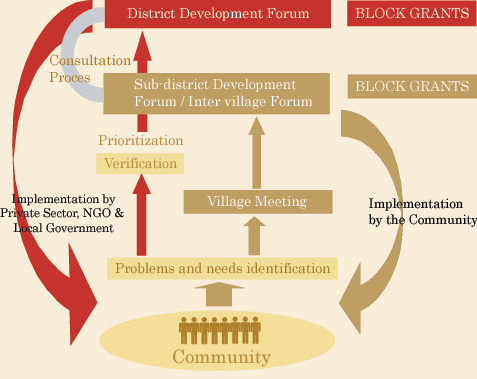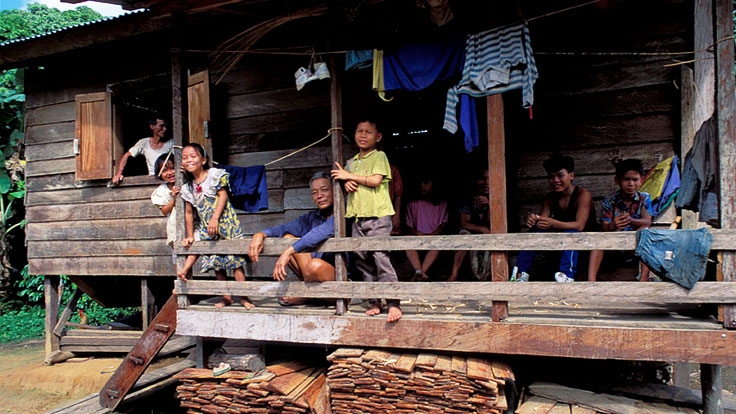Overview
The Support for Poor and Disadvantaged Areas Project (SPADA), or Percepatan Pembangunan Daerah Tertinggal Dan Khusus (P2DTK) in Bahasa Indonesia, is an innovative pilot program began by the Government of Indonesia in August 2005, designed to address governance and policy problems in 51 of the poorest districts across the country. SPADA builds on other successful community development projects, such as the Kecamatan (Sub-District) Development Program (KDP), to align bottom-up planning procedures with the newly empowered district governments of Indonesia.
The program operates in 51 districts and 186 sub-districts across ten provinces: Bengkulu, West Kalimantan, Central Kalimantan, Lampung, Maluku, North Maluku, Aceh, Central Sulawesi, North Sumatera, and Nusa Tengara Timur (NTT).
Challenges
Throughout Indonesia, as well as other developing countries, experience has shown that community-based recovery strategies are under most circumstances quicker, involve more affected people in their own recovery, and are more likely to lead to sustainable solutions than top-down strategies. Community-driven and other participatory approaches to development planning are also likely to promote local solutions to problems of social conflict, which are extremely common in reconstruction situations where differing levels of damages translate into different entitlements and perceptions.
However, community-based approaches also have their limitations. For conflict-affected regions of Indonesia, the roles of district authorities in arbitrating disputes and deploying authority are critical. Following Indonesia’s “big bang” decentralization over 2002-2005, the roles of district line agencies and planning bodies have become fundamental for development service delivery. A major challenge lies in how to link the positive lessons of community-based planning with the technical and administrative regime of the decentralized district governments.
Approach
The Support for Poor and Disadvantaged Areas Project (SPADA), or Percepatan Pembangunan Daerah Tertinggal Dan Khusus (P2DTK) in Bahasa Indonesia, is an innovative pilot program began by the Government of Indonesia in August 2005, designed to address governance and policy problems in 51 of the poorest districts across the country. SPADA builds on other successful community development projects, such as the Kecamatan (Sub-District) Development Program (KDP), to align bottom-up planning procedures with the newly empowered district governments of Indonesia.
The program operates in 51 districts and 186 sub-districts across ten provinces: Bengkulu, West Kalimantan, Central Kalimantan, Lampung, Maluku, North Maluku, Aceh, Central Sulawesi, North Sumatera, and Nusa Tengara Timur (NTT).
- Trained facilitators assist villagers in a participatory planning process, helping them identify problems and create local solutions.
- Communities then submit proposal ideas to the program’s technical review teams for consideration as either a sub-district or district project.
- The relevant team reviews and submits proposals to the Community Prioritization Forum, where all villages in the sub-district/district are represented, and 6 persons from each village have an equal vote in choosing the projects that are selected for block grants averaging USD 50,000 per project, as well as elect community members to make up the management team (TPK) that will oversee all projects.
- Projects will be grouped by sector, and the local government agency (Dinas) will partner with the management team, or also contract out for project implementation.

Results
Until 2011, SPADA/Disadvantaged PNPM Mandiri has funded more than 10,631 infrastructure, economic, and social activities across the country. Below is an illustrative list of investments:
- 1,214.5 km of roads built or upgraded
- 482 bridges built or reconstructed
- 557 drainage built or rehabilitated
- 151 irrigation systems built
- 3,790 clean water supply units built.
- For education, construction and renovation of 655 schools; 1,467 provision of school equipment materials; 18,722 individual educational scholarships.
- For health, construction and renovation of 366 village health units and posts.
- 25,105 teachers and 14,172 health cadres trained to improve their capacities
- 86.34% misused of funds recovered (6.6 billion Rupiah)
- 113 Scholl Based Management trained to schools and gave value added to regular government program
- 44% sub-projects support the improvement of basic services delivery
- More than six business forum at districts level established and functioned to support business enabling environment
- More than 12 districts adopting recommendations for improvement in their regulatory environment
- Persons benefiting from legal aid, case handling assistance through the project: 69,000
- SPADA block grants have opened up access to previously isolated villages, improved opportunities to start small businesses, and improved the access to health and education services in disadvantaged communities.
- In Aceh, reported new business registrations have been increased 94% during 2008 -2010
- More than 3 % of government contribution to support project implementation and monitoring
Bank Contribution
Total funds allocation since 2005 until 2011:
US $ 106.5 million from World Bank loan and US $ 34.9 million grant from:
- Multi Donor Trust Fund (US $ 25.6 million)
- Department for International Development (US $ 5.9 million)
- Japan Social Development Fund (US $ 3.4 million)
Toward the Future
Disadvantaged PNPM Mandiri is presently preparing for its final year and will collaborate with local governments to ensure the sustainability of project initiatives and practices, including hand-over of sub-projects and replicating good SPADA practices. Prior to project closing and for adding value on project’s result, the government will provide additional block grant in seven districts in West Kalimantan and Central Sulawesi.

